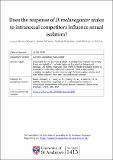Files in this item
Does the response of D. melanogaster males to intrasexual competitors influence sexual isolation?
Item metadata
| dc.contributor.author | Marie-Orleach, Lucas | |
| dc.contributor.author | Sanz, Annui M. | |
| dc.contributor.author | Bailey, Nathan W. | |
| dc.contributor.author | Ritchie, Michael G. | |
| dc.date.accessioned | 2021-01-06T00:40:36Z | |
| dc.date.available | 2021-01-06T00:40:36Z | |
| dc.date.issued | 2020-03 | |
| dc.identifier | 268563910 | |
| dc.identifier | f48c597a-34a2-4f4c-bdfc-d6a4833d2e0d | |
| dc.identifier | 000537266400023 | |
| dc.identifier | 85085093112 | |
| dc.identifier.citation | Marie-Orleach , L , Sanz , A M , Bailey , N W & Ritchie , M G 2020 , ' Does the response of D. melanogaster males to intrasexual competitors influence sexual isolation? ' , Behavioral Ecology , vol. 31 , no. 2 , pp. 487-492 . https://doi.org/10.1093/beheco/arz209 | en |
| dc.identifier.issn | 1045-2249 | |
| dc.identifier.other | ORCID: /0000-0001-7913-8675/work/75996662 | |
| dc.identifier.other | ORCID: /0000-0003-3531-7756/work/75997087 | |
| dc.identifier.uri | https://hdl.handle.net/10023/21225 | |
| dc.description | Funding: This work was supported by the Swiss National Science Foundation (P2BSP3_158842 and P300PA_171516 to L.M.O.) and the Natural Environment Research Council (NE/L011255/1 to N.W.B. and NE/J020818/1 to M.G.R.). | en |
| dc.description.abstract | The evolutionary consequences of phenotypic plasticity are debated. For example, reproductive barriers between incipient species can depend on the social environment, but most evidence for this comes from studies focusing on the effects of experiencing heterospecific individuals of the opposite sex. In Drosophila melanogaster, males are well known to invest strategically in ejaculate components and show different courtship behavior when reared in the presence of male competitors. It is unknown whether such plasticity in response to same-sex social experience influences sexual isolation, so we tested this using African and cosmopolitan lines, which show partial sexual isolation. Males were housed in social isolation, with homopopulation, or with heteropopulation male partners. We then measured their mating success, latency, and duration, their paternity share, and female remating success. Isolated males copulated for a shorter duration than males housed with any male partners. However, we found no difference in any measure between homopopulation or heteropopulation treatments. Our findings suggest that the male intrasexual competitive social environment does not strongly influence sexual isolation in D. melanogaster, and that plastic effects on reproductive isolation may be influenced more strongly by the experience of social isolation than by the composition of individuals within different social environments. | |
| dc.format.extent | 6 | |
| dc.format.extent | 505380 | |
| dc.language.iso | eng | |
| dc.relation.ispartof | Behavioral Ecology | en |
| dc.subject | Behavioral isolation | en |
| dc.subject | Postmating sexual isolation | en |
| dc.subject | Premating sexual isolation | en |
| dc.subject | Social learning | en |
| dc.subject | Speciation | en |
| dc.subject | Species recognition | en |
| dc.subject | QH301 Biology | en |
| dc.subject | DAS | en |
| dc.subject.lcc | QH301 | en |
| dc.title | Does the response of D. melanogaster males to intrasexual competitors influence sexual isolation? | en |
| dc.type | Journal article | en |
| dc.contributor.sponsor | NERC | en |
| dc.contributor.sponsor | NERC | en |
| dc.contributor.institution | University of St Andrews. School of Biology | en |
| dc.contributor.institution | University of St Andrews. Centre for Biological Diversity | en |
| dc.contributor.institution | University of St Andrews. Institute of Behavioural and Neural Sciences | en |
| dc.identifier.doi | 10.1093/beheco/arz209 | |
| dc.description.status | Peer reviewed | en |
| dc.date.embargoedUntil | 2021-01-06 | |
| dc.identifier.grantnumber | NE/L011255/1 | en |
| dc.identifier.grantnumber | NE/J020818/1 | en |
This item appears in the following Collection(s)
Items in the St Andrews Research Repository are protected by copyright, with all rights reserved, unless otherwise indicated.

